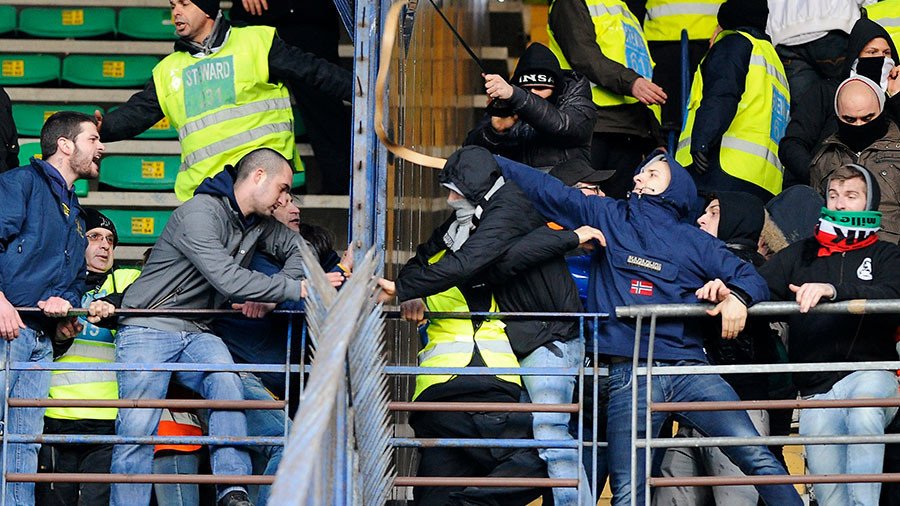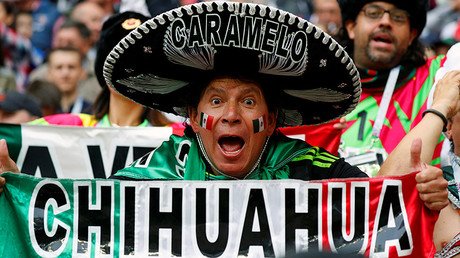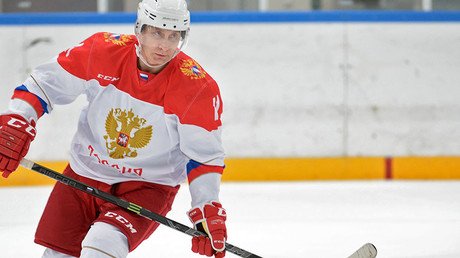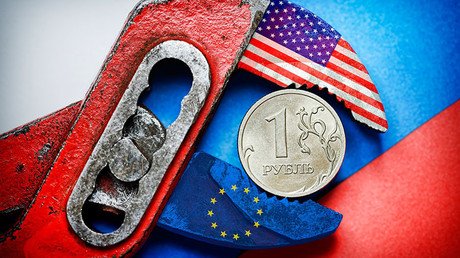Don’t let the Russophobes make hooliganism a geopolitical football

The news that a Liverpool supporter had been brutally attacked by Roma fans did make the papers - but just imagine the reaction if the assailants had been Russian.
Every day we hear about "Russian hooligans" and that English fans should not be traveling to the World Cup. Geopolitics has come before genuine concerns over safety.
Sean Cox, a 53-year-old father of three from County Meath in Ireland, is currently fighting for his life in hospital having been set upon by rival fans before Liverpool’s Champions League semi-final home tie against the Italian side Roma.
Two men in their 20s have been arrested on suspicion of attempted murder. Furthermore, another seven Roma fans are being held for various offences which took place at Tuesday’s match.
READ MORE: 2 Italian fans arrested on suspicion of attempted murder of Liverpool fan after pre-game clashes
The sickening assault on Cox is a reminder of how football hooliganism remains a serious international problem. Yet to hear some people talking, you’d think that Russia is the only country in the world where fans are in danger.
In fact, Russia has done much to clean up its act in recent years, particularly since the violence in Marseilles between Russian and English fans at the 2016 European Championships, which left two England supporters in comas. Penalties for causing trouble in and around grounds could, depending on the violation, lead to up to 15 days of administrative arrest and a maximum of a seven-year ban from attending sporting events.
There is usually a big police presence around the stadia at major games, as I witnessed myself at Zenit St Petersburg in late 2016. Special police teams have been trained to spot members of notorious hooligan ‘Firms’ and weed them out.
The crackdown on yobs has clearly paid dividends. Last year, Russia hosted the Confederations Cup, the traditional aperitif for the World Cup, and the tournament was a great success, with fans from all over the world mingling happily.
‘Super friendly, welcoming & humble!’ – Mexican fans on Russian #ConfedCup welcome https://t.co/NdufW990El
— RT Sport (@RTSportNews) June 25, 2017
Moreover, top English club sides such as Liverpool, Man Utd, and most recently Arsenal, who took on CSKA Moscow earlier in April, have played in Russia and their supporters have returned safely. In fact they’ve generally enjoyed the experience. It was reported that local schoolchildren gave every Arsenal supporter in Moscow a traditional Russian hat as a “gesture of goodwill.”
Yet despite this there continues to be painted nightmarish scenarios for England fans planning to travel to Russia this summer. England fans were in danger of “extreme violence” from Russian hooligans, the national football policing head Mark Roberts told the Daily Telegraph, even though he admitted that the Russian state authorities had given reassurances on security.
This month, Rupert Murdoch’s Sun declared that “web football forums and social media in Russia are awash with sinister threats and images showing thugs training for the blood-thirsty battle ahead.”
Two days ago the Guardian joined in, with a ‘long read’ on “The Rise of Russia’s NeoNazi Football Hooligans.”
It begins with the words: “The day that Denis Nikitin, a Russian neo-Nazi who claims he once kept a framed photograph of Joseph Goebbels in his bedroom, took part in his first street fight, his mother made him a packed lunch. During the past 12 years, the Moscow-based MMA fighter has become a rising star of the far right, after brawling his way up through the ranks of one of Russia’s top hooligan firms.”
Do you still want to go to Russia after reading that? Reading media portrayals on Russia at the moment, you’d think everyone in the country was a neo-Nazi with framed photographs of Joseph Goebbels in their bedroom. But guess what. I’ve been to Russia four times - and have yet to meet a single neo-Nazi, or indeed have an encounter with a football hooligan. Am I just going to the wrong places?
It’s clear that geopolitics is at play here. The Western, neocon-infiltrated Establishment is angry with Russia for blocking regime-change plans for Syria, so they trash absolutely everything to do with the country. Whatever Russia does to stamp out hooliganism won’t be enough.
The fear that agents provocateurs will be deployed by security services of countries hostile to Russia, to try and stir up trouble between rival sets of fans cannot be ruled out, and needs to be guarded against. Certain political lobby groups I’m afraid to say would welcome outbreaks of violence between Russian and English supporters as these incidents could then be used as a fresh pretext for even tougher sanctions on Russia. Let’s be honest: The last thing the professional Russophobes want is for the World Cup in Russia to be a success. For this reason they have tried to sabotage it at every turn. As early as May 2015, Russia-Hater-in-Chief, Senator John McCain, was calling on FIFA to deny Russia the World Cup.
The obsessive focus on hooliganism in Russia means less focus on other countries where violence is clearly an issue. This week’s attack on Liverpool fans comes after Roma ‘Ultras’ attacked Chelsea supporters drinking in a bar in Rome before another Champions League clash in October.
There was also violence involving German fans in Liverpool last year, while last February, almost 100 people were arrested after a violent brawl between rival fans in Berlin.
In England itself, hooliganism, while reduced since the 1980s, is still very much around. Earlier this month, the Manchester City team coach was attacked with missiles, bottles and flares as it approached the Anfield football ground.
Football violence is a global problem. Last April, a young fan was killed after a brutal attack by supporters of the same team during an Argentinian first division match.
“In opposition to love, appreciation and affection, the red month of February has seen football fans around the world engage in outrageous acts of hooliganism and reckless violence,” declared South Africa’s Daily Star in February 2017 after incidents which included eight people being hospitalized in Rio de Janeiro.
While that was shocking, a sense of perspective is also needed. Although more still needs to be done against hooliganism, the fact is that the vast majority of football matches take place without any violence. I’ve been going to games since the 1970s, and have visited stadia as diverse as Old Trafford, the San Mames in Bilbao and FC Magdeburg’s in the old East Germany, and the worst I have experienced was coins raining down on me - and other Sheffield Wednesday fans, at a cup tie against Chelsea in 1985. I have been physically attacked twice in my life, but neither occasion was connected with football.
While a very, very, small minority may attend looking for a punch-up, most fans are good, decent people, who simply want to cheer their team on and watch some great action. Do enjoy the World Cup this summer - it should be a cracker. And don’t let those pushing an anti-Russian geopolitical agenda put you off going.
Follow Neil Clark on Twitter @NeilClark66
Think your friends would be interested? Share this story!
The statements, views and opinions expressed in this column are solely those of the author and do not necessarily represent those of RT.

















